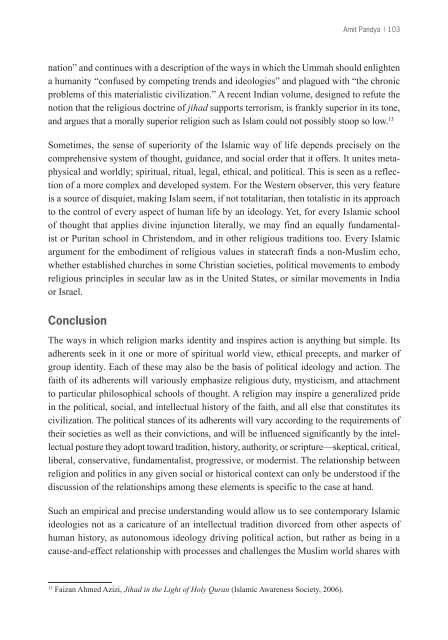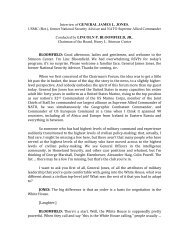Islam and Politics - The Stimson Center
Islam and Politics - The Stimson Center
Islam and Politics - The Stimson Center
Create successful ePaper yourself
Turn your PDF publications into a flip-book with our unique Google optimized e-Paper software.
Amit P<strong>and</strong>ya | 103<br />
nation” <strong>and</strong> continues with a description of the ways in which the Ummah should enlighten<br />
a humanity “confused by competing trends <strong>and</strong> ideologies” <strong>and</strong> plagued with “the chronic<br />
problems of this materialistic civilization.” A recent Indian volume, designed to refute the<br />
notion that the religious doctrine of jihad supports terrorism, is frankly superior in its tone,<br />
<strong>and</strong> argues that a morally superior religion such as <strong>Islam</strong> could not possibly stoop so low. 13<br />
Sometimes, the sense of superiority of the <strong>Islam</strong>ic way of life depends precisely on the<br />
comprehensive system of thought, guidance, <strong>and</strong> social order that it offers. It unites metaphysical<br />
<strong>and</strong> worldly; spiritual, ritual, legal, ethical, <strong>and</strong> political. This is seen as a reflection<br />
of a more complex <strong>and</strong> developed system. For the Western observer, this very feature<br />
is a source of disquiet, making <strong>Islam</strong> seem, if not totalitarian, then totalistic in its approach<br />
to the control of every aspect of human life by an ideology. Yet, for every <strong>Islam</strong>ic school<br />
of thought that applies divine injunction literally, we may find an equally fundamentalist<br />
or Puritan school in Christendom, <strong>and</strong> in other religious traditions too. Every <strong>Islam</strong>ic<br />
argument for the embodiment of religious values in statecraft finds a non-Muslim echo,<br />
whether established churches in some Christian societies, political movements to embody<br />
religious principles in secular law as in the United States, or similar movements in India<br />
or Israel.<br />
Conclusion<br />
<strong>The</strong> ways in which religion marks identity <strong>and</strong> inspires action is anything but simple. Its<br />
adherents seek in it one or more of spiritual world view, ethical precepts, <strong>and</strong> marker of<br />
group identity. Each of these may also be the basis of political ideology <strong>and</strong> action. <strong>The</strong><br />
faith of its adherents will variously emphasize religious duty, mysticism, <strong>and</strong> attachment<br />
to particular philosophical schools of thought. A religion may inspire a generalized pride<br />
in the political, social, <strong>and</strong> intellectual history of the faith, <strong>and</strong> all else that constitutes its<br />
civilization. <strong>The</strong> political stances of its adherents will vary according to the requirements of<br />
their societies as well as their convictions, <strong>and</strong> will be influenced significantly by the intellectual<br />
posture they adopt toward tradition, history, authority, or scripture—skeptical, critical,<br />
liberal, conservative, fundamentalist, progressive, or modernist. <strong>The</strong> relationship between<br />
religion <strong>and</strong> politics in any given social or historical context can only be understood if the<br />
discussion of the relationships among these elements is specific to the case at h<strong>and</strong>.<br />
Such an empirical <strong>and</strong> precise underst<strong>and</strong>ing would allow us to see contemporary <strong>Islam</strong>ic<br />
ideologies not as a caricature of an intellectual tradition divorced from other aspects of<br />
human history, as autonomous ideology driving political action, but rather as being in a<br />
cause-<strong>and</strong>-effect relationship with processes <strong>and</strong> challenges the Muslim world shares with<br />
13<br />
Faizan Ahmed Azizi, Jihad in the Light of Holy Quran (<strong>Islam</strong>ic Awareness Society, 2006).

















